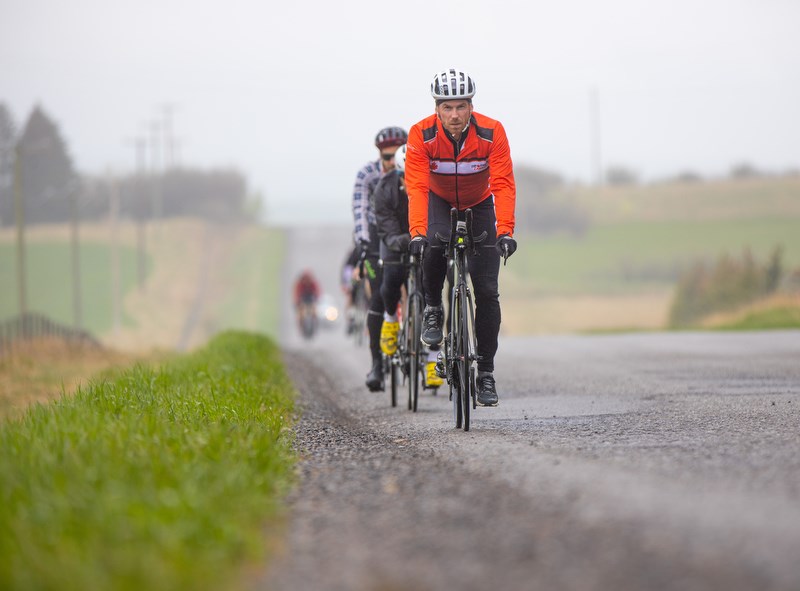As the tension between cyclists and residents increases, the organizer of the June 15 Chinook Gran Fondo—which means “Big Ride” in Italian—aims to ease some of that with cycling etiquette.
The bike etiquette workshop at Granary Road on May 25 was one way to do that for the organizer of the event, Tom Bamford, who said cycling on these roads is a privilege, not a right.
“We’ve got upcoming events and we wanted to have a reconnaissance, if you will, and also to talk about if you’re on these roads the best practices of riding” said Bamford. “Some of (the roads) are rather narrow, they don’t have line-of-sight, traffic can come around a corner very quickly and they’re quiet.
“You think ‘It’s just us and our friends, we can have a talk and go wide on the shoulder and spread out,’ but it’s not conducive to safety.”
A concern for County residents is the blind corners and hills, and the risk of hitting cyclists, which is why safety is so important to Bamford.
“We’re guests in somebody else’s backyard,” he said. “They’re public roads, but people live here so we want to have good relationships. There’s more and more cycling happening, people coming out here, this is a great place to ride.”
The beauty of the Foothills and the draw of the local businesses play a significant role in the cycling boom that has happened in recent years, said Bamford.
Giving back to the local economy is also important and the reason for the partnership with Granary Road, which is serving as the start and end point of the Gran Fondo event.
“It’s a mass participation event, so people come out and do different distances ranging from about 60K to 140K, and they come back to a great meal, a beer garden, a big celebration (at Granary Road),” he said.
For Bamford, best practices for cycling is both etiquette between riders and road etiquette, which includes wearing bright clothing, flashing lights on the bike, riding single file and staying to the shoulder.
“These are etiquette for the road and we want to make people know that it matters because it’s sort of, I wouldn’t say it’s gone downhill but there’s a lot of new riders that just don’t know better,” he said.
As a resident of south Calgary, Bamford has been riding in Foothills County for over 30 years.
He said the relationship to cyclists has only gotten bad in the last five years, and he thinks he knows why.
“I see drivers frustrated that I’m even around, throwing cans at me or gassing me with their exhaust,” he said. “What happened? Why even is there this friction? I’m out here alone. And I think other people have caused it, cyclists.”
Trying to find that balance of responsibility for cyclists is the way to fix it, he said, comparing it to not texting while driving.
The Gran Fondo route was recently changed to avoid the Millarville Market entirely, after Foothills County Council objected to the convergence of the Gran Fondo, the Millarville Market, and the Run 4 A Cause Millarville half marathon occurring on the same day on the same major roads.
“As a race director, it’s my job to bring everyone home safe and that’s mostly prevention,” said Bamford.
That prevention will include professional flagmen to warn athletes and traffic, choosing better roads for congestion and having pilot cars for roads with poor line-of-sight.
Also at the workshop was south Calgary triathlete Jenna-Caer Seefried, who won the 2017 Penticton ITU Long Distance Triathlon World Championships for the 25-29 female age group. Seefried is a triathlon coach in addition to racing, and is currently training in the Foothills for a full Ironman triathlon.
“For the most part I think cyclists and drivers get along fairly well, if you’re riding responsibly,” she said.
“Sometimes you get drivers that are angry that cyclists are riding on the roads altogether and then you get cyclists that just don’t know how to ride on the road safely.”
Foothills County council discussed upcoming cycling events at the May 22 meeting, and expressed frustration of its own with the scheduling and routes of the events and that blame lies with Alberta Transportation.
Coun. Suzanne Oel said that residents get annoyed with the council for approving large-scale cycling events, but emphasized that Alberta Transportation approves the events, not council.
“...The way it looks is they’re not really holding back on that approval and that’s certainly another topic to bring up with Alberta Transportation… to discuss how many events is too many in a single day, every weekend of the summer with no relief for the residents” she said.
“I just want to keep expressing our concerns because we’re going to be blamed in the end if there are any issues.”
For future cycling events, council aims to limit use to roads with shoulders and to work with Alberta Transportation on scheduling events and routes to avoid wearing down residents’ patience.




